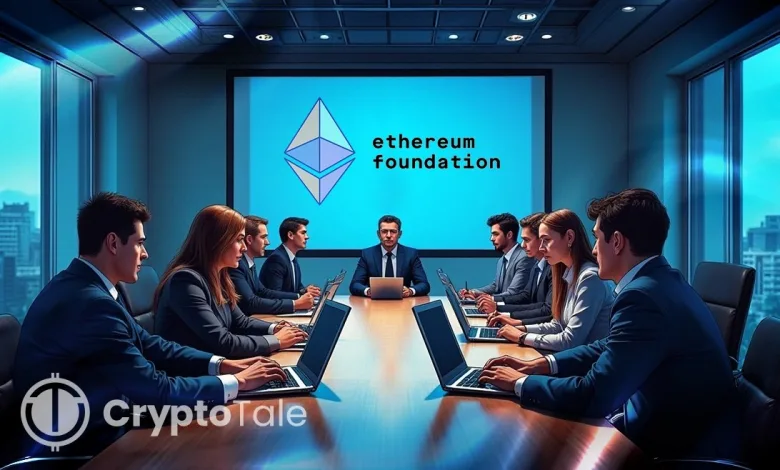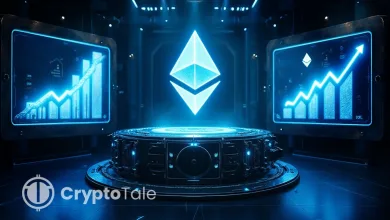Ethereum Foundation Prioritizes Interoperability to Enhance UX

- Ethereum Foundation makes interoperability its top UX priority across Layer-2 networks.
- Roadmap targets faster confirmations and smoother cross-chain user experience on Ethereum.
- Developers plan Ethereum upgrades with faster settlement, zero-knowledge proving, and privacy.
The Ethereum Foundation has made interoperability its top near-term priority, unveiling a protocol update that focuses on unifying the blockchain’s fragmented Layer-2 ecosystem. In its blog post, the Foundation stated that interoperability is the highest leverage opportunity within the broader UX domain over the next 6–12 months.
The initiative follows earlier work on scaling Ethereum’s base layer and expanding blob data capacity. Developers now plan to make the network a seamless chain for users and institutions, addressing latency, high settlement times, and inconsistent experiences across Layer-2 rollups.
Open Intents Framework and Ethereum Interoperability Layer
Under the first development stream, known as Initialization, engineers are rolling out the Open Intents Framework (OIF). The Foundation explained that intents allow users to state desired outcomes without specifying low-level transactions. According to the update, the OIF was built “from the ground up to be as lightweight and customizable as possible, to accommodate different requirements and use cases across Ethereum’s ecosystem of L2s.”
The OIF includes contributions from Across, Arbitrum, Hyperlane, LI.FI, OpenZeppelin, and Taiko. Production contracts are live, with audits and cross-chain validation modules due by the end of 2025. Alongside OIF, developers are preparing the Ethereum Interoperability Layer (EIL), which aims to make transactions across Layer-2s feel like single-chain execution.
The update stated that the Ethereum Interoperability Layer focuses on making Ethereum, without compromising on CROPS values (censorship-resistance, open-source, privacy, and security). A public design document for EIL is scheduled for release in October.
To reduce friction, the Foundation and its partners are also advancing new interoperability standards, including ERC-7828 for addresses and ERC-7683 for intent formats. These standards are designed to simplify wallet integration and ensure consistent application behavior across multiple networks.
Speeding up confirmations and settlements
The second stream, Acceleration, focuses on reducing latency and is being handled by Roberto Saltini and Mikhail Kalinin of Consensys. Reportedly, this will reduce confirmations to 15 to 30 seconds from its current 13 to 19 minutes. Availability across consensus clients is targeted for early 2026. Further efforts include halving Layer-1 slot times from 12 seconds to six.
Researchers Dankrad Feist and Maria Inês Silva are studying the performance impact and centralization risks and noted that shorter slots would “reduce fees and latency for users of interoperability protocols, as well as provide a greater incentive to use secure L1 settlement.”
On Layer-2 networks, developers are supporting faster settlement mechanisms. Optimistic rollups currently require a week-long challenge window, but teams are testing zero-knowledge proofs and “two-of-three” validation models to shorten withdrawal delays.
Related: Goldman Sachs Emerges as Top Holder of Ethereum ETFs
Advancing real-time proving and security
The final stream, Finalization, looks ahead to zero-knowledge proving and faster Layer-1 finality. The update emphasized that “it is not possible today to ignore the snarkification of everything, in particular as it relates to interoperability solutions.” Snarkification refers to using zero-knowledge proofs to achieve faster settlement and synchronous composability across chains.
At the same time, the Foundation’s Consensus team is exploring ways to cut finality times to seconds. Research includes three-slot finality and new consensus protocols such as Kudzu and Hydrangea. The roadmap also links to other Ethereum Foundation initiatives.
Led by Fredrik Svantes and Josh Stark, the Trillion Dollar Security program is dedicated to wallet safety and signing standards, while the Kohaku privacy wallet project, co-led by Vitalik Buterin and Nicolas Consigny, would provide a browser extension featuring privacy addresses and balances.




